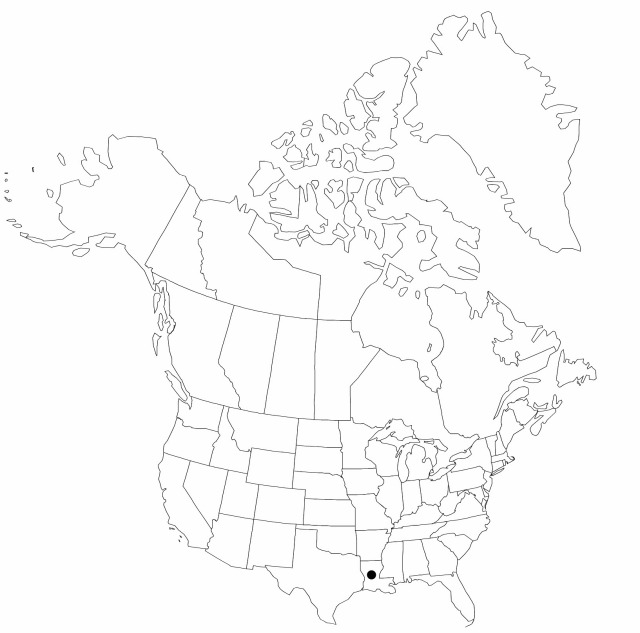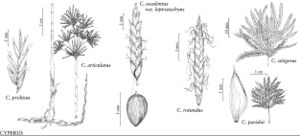Difference between revisions of "Cyperus prolixus"
in A. von Humboldt et al., Nov. Gen. Sp. 1: 206. 1816.
FNA>Volume Importer |
imported>Volume Importer |
||
| (2 intermediate revisions by 2 users not shown) | |||
| Line 1: | Line 1: | ||
{{Treatment/ID | {{Treatment/ID | ||
|accepted_name=Cyperus prolixus | |accepted_name=Cyperus prolixus | ||
| − | |accepted_authority=Kunth | + | |accepted_authority=Kunth |
|publications={{Treatment/Publication | |publications={{Treatment/Publication | ||
|title=in A. von Humboldt et al., Nov. Gen. Sp. | |title=in A. von Humboldt et al., Nov. Gen. Sp. | ||
|place=1: 206. 1816 | |place=1: 206. 1816 | ||
|year=1816 | |year=1816 | ||
| + | }} | ||
| + | |special_status={{Treatment/ID/Special_status | ||
| + | |code=F | ||
| + | |label=Illustrated | ||
}} | }} | ||
|basionyms= | |basionyms= | ||
| Line 36: | Line 40: | ||
-->{{#Taxon: | -->{{#Taxon: | ||
name=Cyperus prolixus | name=Cyperus prolixus | ||
| − | |authority=Kunth | + | |authority=Kunth |
|rank=species | |rank=species | ||
|parent rank=subgenus | |parent rank=subgenus | ||
| Line 49: | Line 53: | ||
|publication title=in A. von Humboldt et al., Nov. Gen. Sp. | |publication title=in A. von Humboldt et al., Nov. Gen. Sp. | ||
|publication year=1816 | |publication year=1816 | ||
| − | |special status= | + | |special status=Illustrated |
| − | |source xml=https:// | + | |source xml=https://bitbucket.org/aafc-mbb/fna-data-curation/src/2e0870ddd59836b60bcf96646a41e87ea5a5943a/coarse_grained_fna_xml/V23/V23_271.xml |
|genus=Cyperus | |genus=Cyperus | ||
|subgenus=Cyperus subg. Cyperus | |subgenus=Cyperus subg. Cyperus | ||
Latest revision as of 20:39, 5 November 2020
Herbs, perennial; rhizomes 3–20 cm × 1–2 cm, indurate. Culms stoutly trigonous, thickened, 50–300 cm × 5–30 mm, basally indurate, glabrous. Leaves V-shaped, with cross ribs, 40–130 cm × 10–15 mm, margins and keel scabrid. Inflorescences: spikes appressed-ascending, narrowly cylindric, (2–)3–45 mm × (4–)7–10 mm; rays (5–)9–12, 2–22(–30) cm; 2d order rays distinctly flattened, 1–10 cm; 3d order rays flattened, 0.5–3 cm; rachis 2.5–4 cm; bracts (6–)9–10, ascending at 45–75°, V- or inversely W-shaped, (5–)15–90 cm × 0.5–20 mm; rachilla persistent, wings 0.2–0.4 mm wide. Spikelets (4–)10–35, appressed-ascending, compressed, linear, 7–12(–15) × 0.6–1.2 mm; floral scales deciduous, 6–20, marginally clear, laterally brown, medially green, laterally 2–3-ribbed, medially 1-ribbed, oblong-ovate, (3.2–) 3.8–4.3 × 1.2–1.7 mm, apex spreading, acute to obtuse, mucronulate. Flowers: anthers 0.7–0.9 mm, connective apex bright red, oblong, to 0.1 mm; styles 0.8–1.3 mm; stigmas 2–3.3 mm. Achenes brown, sessile, narrowly ellipsoid, 1.8–2.5 × 0.8–1.3 mm, apex ± acute, not apiculate, surfaces puncticulate.
Phenology: Fruiting summer.
Habitat: Coastal marshes
Elevation: 0–10 m
Distribution

La., Mexico, Central America, South America.
Discussion
Cyperus prolixus produces large plants, similar in habit to C. giganteus and C. papyrus but easily distinguished by flattened rays.
Selected References
None.
